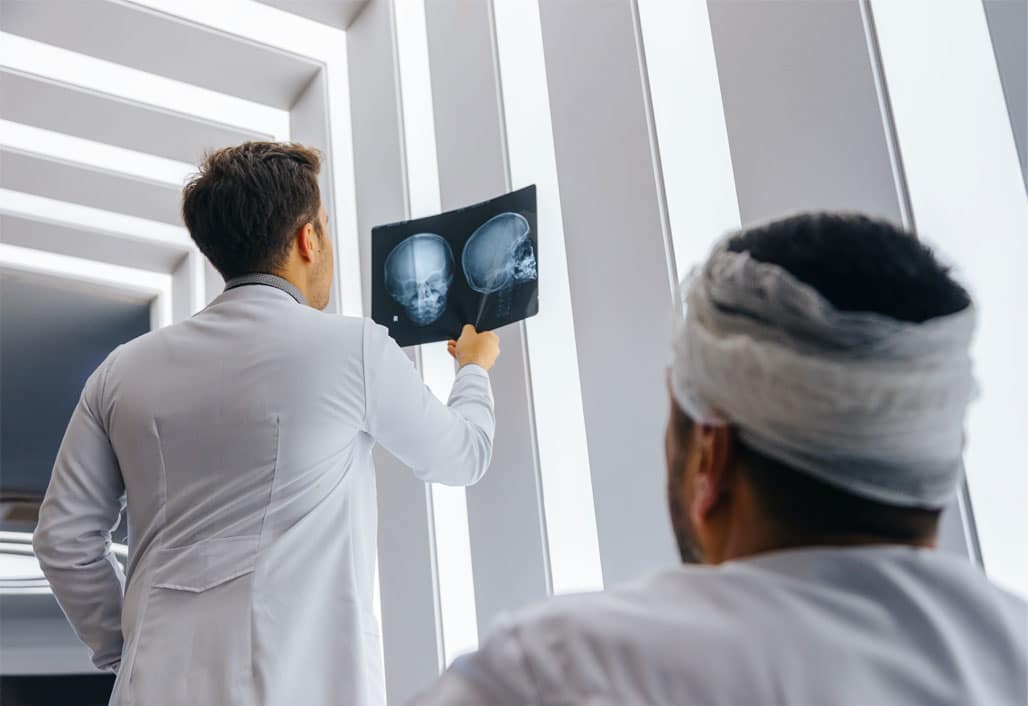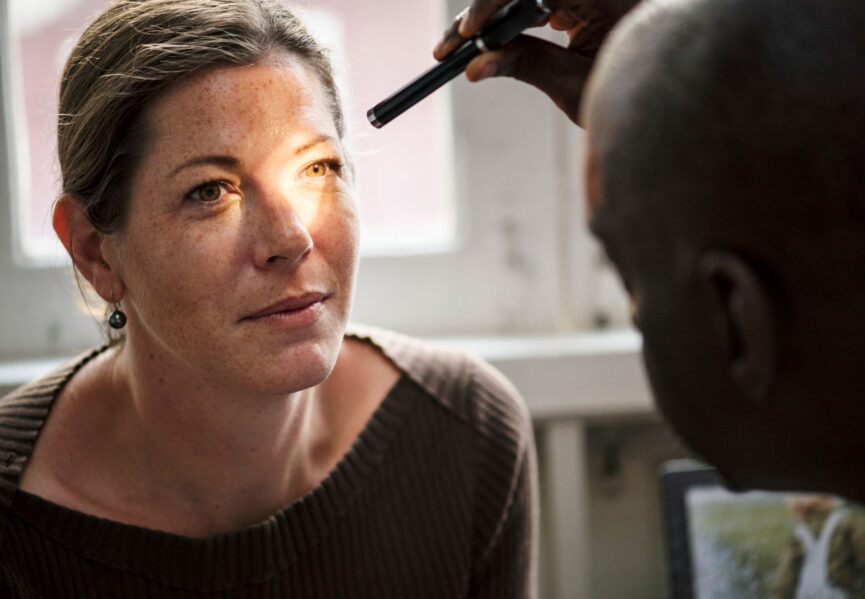Concussions are especially common in traffic accidents and slip-and-fall accidents, and determining whether you’ve suffered this type of brain injury can be challenging.
A concussion is a serious injury that can lead to long-lasting complications. Concussions are common in traffic accidents of every kind and to slip-and-fall accidents. Some of the challenging aspects of concussions are that they are unpredictable injuries, can be slow to become symptomatic, and can be difficult to treat effectively. While there is no definitive checklist when it comes to determining if you might have a concussion, there are some signs that you should know and be on the lookout for if you are ever in a situation in which you think you or someone you love may have suffered a concussion. If your injury is the result of someone else’s negligence, reaching out for the skilled legal guidance of an experienced California personal injury attorney early in the process is always in the best interest of your claim and your recovery.
Concussions
The Centers for Disease Control and Prevention (CDC) shares important information related to concussions and other forms of traumatic brain injuries (TBIs). These injuries directly affect the way the brain works, which makes them incredibly dangerous and difficult to treat. Concussions are generally caused by a bump, a blow, or a jolt to the victim’s head or by force to the body that causes the victim’s head to move back and forth on the neck forcefully. In the process, any of the following can happen:
- The brain can be bounced or twisted within the confines of the skull.
- The cells in the brain can be stretched or otherwise damaged.
- The brain can experience chemical changes.
These effects can lead to health consequences that affect how the victim does all the following:
- Processes information
- Feels
- Thinks
- Acts
- Solves problems
- Sleeps
A concussion can also interfere with a victim’s memory and can lead to problems related to concentration. In other words, a concussion can have overarching negative consequences that can be exceptionally challenging to live with and overcome. Although concussions are considered mild TBIs, they are very serious injuries that should always be taken very seriously.

Spotting the Signs of a Concussion
The Mayo Clinic shares that falls are the most common cause of concussions. The signs associated with concussions can be elusive, may not be dramatic, may be slow to present – and can last for days, weeks, or much longer. If you experience any of the following after a blow to the head or after having your head shaken by a blow to the body, it can be indicative of a concussion:
- Amnesia or loss of memory, such as forgetting the event that caused the concussion in the first place
- A headache or a feeling of pressure in your head
- Confusion or the distinct feeling of being in a fog
- Nausea or vomiting
- A ringing in the ears
- The sudden onset of fatigue or drowsiness
- The onset of dizziness – or of suddenly seeing stars
- Blurred vision
While some signs of a concussion may be immediately apparent, others can be very slow to present, and these can include:
- Complaints in relation to your memory or to your ability to concentrate
- A newly acquired sensitivity to sound or light
- Newly acquired sleep complaints
- A shift in personality, such as increased irritability
- A shift in your sense of taste and smell
- Problems related to psychological adjustments, such as increased anxiety or depression
- Feeling unlike yourself or feeling down generally
Signs that Others May Pick Up On
Some signs of concussion that may alert others to your condition include the following:
- Slurred speech
- A dazed disposition or appearance
- Delayed responses during conversation or delayed answers to questions
- Overall forgetfulness, such as asking the same questions over and over again
- A brief loss of consciousness
Whether you think you may have suffered a concussion or others do, seeking prompt medical attention is the right call.

Seek Immediate Medical Attention
If you have concerns about a concussion and any of the following occur, it’s time to seek immediate medical attention:
- A ringing in your ears that will not abate
- Dilated pupils, pupils of unequal size, or vision disturbances
- A headache that grows progressively worse
- A weakness in your legs or arms
- Any drainage from your nose or ears
- Any changes in your behavior – whether you notice it or it’s pointed out to you by someone you know
- Any disorientation or confusion, such as an inability to recognize people and places known to you
- A very pale appearance that lasts for more than an hour
- Any changes in your speech, including slurred speech
- Any obvious decline in your physical coordination, such as increased clumsiness or a propensity to stumble
- Any lasting dizziness
- Any symptoms that become more serious with time
- Any seizures or convulsions
- Any obvious difficulties with your mental functioning
Ultimately, if someone else’s negligence causes you to experience any bump or impact that leaves you concerned about a concussion, the best course of action is always to get the medical attention you need. The stakes are too high to wait and see what happens.
Concussions Are a Common Form of Injury
CDC shares the following information regarding the number of concussions people in this country experience every year:
- Concussions and other TBIs led to about 223,135 hospitalizations in a recent year.
- Many more were treated in ERs and by primary care and urgent care providers.
- More went untreated.
The most common causes of concussions and other TBIs are traffic accidents and falls.
Traffic Accidents
Common Forms of Traffic Accidents
In fact, concussions are common in every type of traffic accident, including all the following:
- Car accidents
- Truck accidents
- Motorcycle accidents
- Bike accidents
- Pedestrian accidents
Common Causes of Traffic Accidents
Every traffic accident involves its own circumstances, but many concussion-causing traffic accidents are the result of another driver’s negligence, which can take all the following common forms:
- Failure to abide by the traffic laws
- Distracted driving
- Driving that is impaired by alcohol or drugs
- Drowsy driving
- Speeding excessively
- Aggressive driving
Slip-and-Fall Accidents
Falls are exceptionally common and exceptionally dangerous. Consider the following statistic shared by CDC:
- Falls are the most common cause of concussions and other TBIs.
- About 20 percent of all falls lead to serious injuries, including head injuries like concussions.
- More than 800,000 people each year are hospitalized for fall-related injuries, and concussions and other head injuries are among the most common.
- The total medical costs associated with falls in a recent year totaled $50 billion.
The Elements of Your Claim
The last thing you expect to happen in the course of visiting a commercial property is slipping and falling as a result of some obstacle to your safety, but it’s more common than you likely realize. To bring a successful slip-and-fall accident claim against a commercial property owner, you must prove four basic elements.
You Were Owed a Duty of Care
When you enter a business, such as a restaurant, store, market, medical facility, office building, or any other place that is open to the public, you are considered – in the eyes of the law – an invited guest. As an invited guest, you are owed a specific duty of care by the owner or manager of the business, which equates with the property owner or manager having responsibility for your safety. This responsibility extends to keeping the business’s premises in the reasonably safe condition necessary to protect the safety of guests like you.
The Duty of Care Owed Was Breached
The commercial property owner must have breached the duty of care that was owed to you, which means that they failed to maintain the same level of safety that other reasonable property owners maintain in similar circumstances. When it comes to slip-and-fall accidents, such negligence on the part of property owners can take any of the following common forms:
- Failing to keep outdoor walkways and parking structures free of slippery debris
- Failing to keep outdoor walkways and parking structures free of tripping hazards, such as uneven, cracked, sloping, deteriorating, or otherwise dangerous walkways
- Failing to maintain adequate indoor or outdoor lighting
- Failing to clean up spills or tracked-in moisture or debris in a timely manner
- Failing to maintain safe staircases, elevators, or escalators
- Failing to keep indoor walkways, doorways, or entrances free of slipping hazards
- Having overly slippery flooring that represents a slipping hazard in the first place
The Property Owner’s Negligence Caused Your Injury
The lapsed duty of care on the part of the property owner must have been the direct cause of your slip-and-fall accident – and subsequent concussion. In other words, you must connect the property owner’s negligence with the accident that leaves you injured. Forms of negligence like those explored above are commonly linked to slip-and-fall accidents.
You Suffered Legal Damages
The final element of your slip-and-fall accident claim is that you suffered legal damages, which refer to forms of loss that are addressed by the law. These damages can include physical, financial, and emotional losses.
Your Damages
Whether you suffer a concussion in a traffic accident or a slip-and-fall accident, the legal damages you experience are likely to fall into basic categories.


